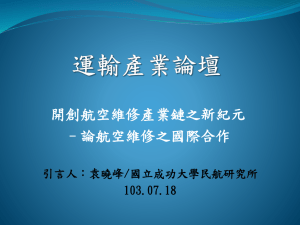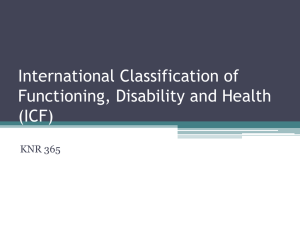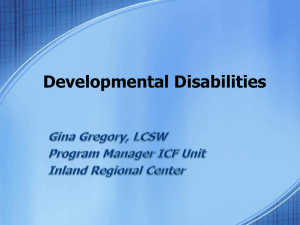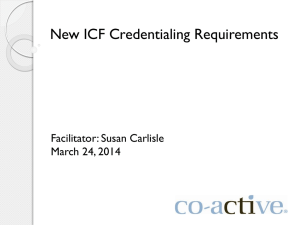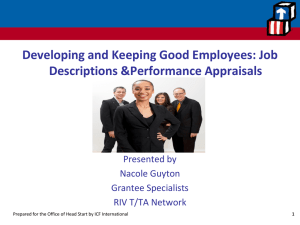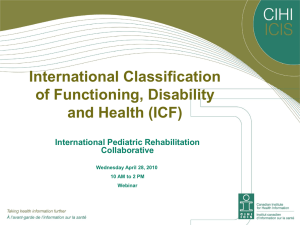He`s So Smart, But... - LiteracyAccess Online
advertisement
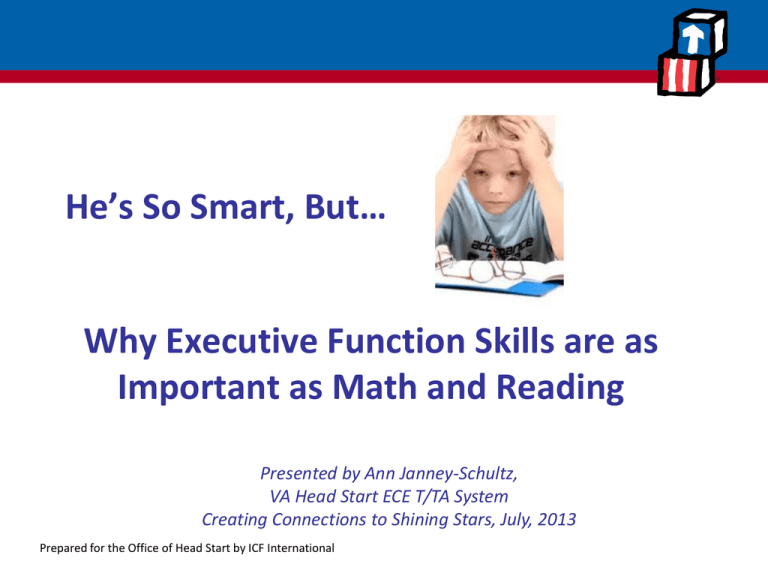
He’s So Smart, But… Why Executive Function Skills are as Important as Math and Reading Presented by Ann Janney-Schultz, VA Head Start ECE T/TA System Creating Connections to Shining Stars, July, 2013 Prepared for the Office of Head Start by ICF International Session Objectives Participants will: • Understand what executive functions are. • Understand why they are important. • Connect executive function skills with early learning frameworks and standards. • Learn strategies for helping children develop and improve their executive functions. Prepared for the Office of Head Start by ICF International What are Executive Functions? • Brain functions used to manage attention, emotions, and pursuit of goals. • Emerge during preschool years and don’t fully mature until early adulthood. • More predictive of school success than IQ. Prepared for the Office of Head Start by ICF International • Cognitive Control abilities that depend on the prefrontal cortex. Executive Functions • Cognitive control functions involved in goal-oriented behaviors. • Different from automatic, reactive behaviors Prepared for the Office of Head Start by ICF International Executive Functions Core Executive Functions • Inhibitory Control (self control) • Working Memory • Cognitive Flexibility Higher Order Executive Functions: • Problem solving • Reasoning • Planning Prepared for the Office of Head Start by ICF International Inhibitory Control/Self Control/Effortful Control • The ability to resist a strong inclination to do one thing, and instead do what is most appropriate or needed. – Resisting acting on impulse – Staying focused on what is important-selective or focused attention. – Self control- the ability to think before you act, resist temptation, avoid jumping to conclusions. Prepared for the Office of Head Start by ICF International Inhibitory Control: Focus Test Your Focus http://www.nytimes.com/interactive/2010/06/07/technology/20100607distraction-filtering-demo.html?_r=0 Prepared for the Office of Head Start by ICF International Effortful Control • Basis for self regulation. • Match demands of the situation-sometimes inhibiting, sometimes motivating- Stop and Go functions. Prepared for the Office of Head Start by ICF International Inhibitory Control: Discipline Having the discipline to stay on task • Persistence: Seeing a task through to completion even when it is tedious or difficult. • Begin able to stay focused despite distractions. • Continuing to work although the reward may be a long time coming. Prepared for the Office of Head Start by ICF International Evidence shows that discipline accounts for over twice as much variance in final grades as does IQ, even in college. (Duckworth and Seligman, 2005) Prepared for the Office of Head Start by ICF International Inhibitory Control Being able to: 1. Stay Focused despite distraction 2. Stay on task and complete the task, even in the face of temptation or frustration 3. Exercise self control by considering a response before acting—controlling behavior, responses, and language (not putting your foot in your mouth) Prepared for the Office of Head Start by ICF International Working Memory • Holding Information in mind while mentally working with it or while working on something else. – Follow a conversation while formulating what you want to say in response. – Remembering where something was hidden despite a delay and distractions before you get back to it. – Holding in mind what happened earlier and relating it to what is happening now. – Relating one idea to another. – Relating what you read earlier to what you are learning now. – Understanding cause and effect. Prepared for the Office of Head Start by ICF International Working Memory • Critical to ability to see connections between seemingly unconnected things. • Critical to Creativityability to take apart and re-assemble elements or thoughts in new ways. Prepared for the Office of Head Start by ICF International Cognitive Flexibility: Creativity The ability to easily and quickly switch perspectives of the focus of attention, flexibly adjusting to changed demands or priorities—being able to Think Creatively! Thinking about ways to solve problems that no one else has considered before… Prepared for the Office of Head Start by ICF International Cognitive Flexibility • Ability to change course when what you are doing isn’t working. • Ability to adapt to change easily. • Ability to take advantage and seize opportunities when they arise, even if it means changing course. Prepared for the Office of Head Start by ICF International Why Are Executive Functions Important? Executive Function Skills important for: • School readiness more than are IQ or entry-level reading or math. (Blair, 2002, 2003, Blair and Razza, 2007, Normandeau and Guay, 1998) • School Success: Working Memory and inhibitory control each independently predict both math and reading competence throughout the school years. (Adele Diamond, 2012) • Job Success: Poor EF Skills lead to poor productivity and difficulty finding and keeping a job. Executive Function skills are critical for cognitive, social and psychological development. Prepared for the Office of Head Start by ICF International EF’s and Poverty • Children in poverty are susceptible to cumulative risk, an accumulation of risk factors such as more negative life stress, poor access to health care, more mental health and substance abuse problems in the home, perhaps less than ideal residential situations. • These factors have lasting impact into adulthood. • They disrupt neurobiological systems, especially selfregulation systems. Prepared for the Office of Head Start by ICF International ECLKC/NCQTL/Front Porch Series Executive Functions and Poverty • Children in lower-income families evidence lower levels of effortful control. • Parental behaviors that would support the development of effortful control are observed less often in lower-income families. Prepared for the Office of Head Start by ICF International EF’s and Mental Health • Increase in addictions, ADHD, depression, conduct disorder, and schizophrenia are associated with impaired executive functions. • Children with less self-control (more impulsive, less persistent, poor attention regulation) have worse health, earn less and commit more crimes as adults 30 years later (Terri Moffitt et all , 2011, National Academy of Sciences) Prepared for the Office of Head Start by ICF International Executive Functions and Early Childhood • 46% of kindergarten teachers, in a survey by Robert Pianta and others from UVA, reported that at least half of the children in their classrooms have problems following directions. • Head Start teachers, in another study, reported that more than a quarter of their students exhibited serious self-control-related negative behaviors. Prepared for the Office of Head Start by ICF International EF’s and Early Learning Standards Domain Elements closely associated with Executive Functions: • Head Start Child Development Early Learning Framework (HSCDELF) – Social Emotional Development: Self Regulation – Approaches to Learning: Persistence and Attentiveness • Virginia Foundation Blocks for Early Learning (VFBEL) – Personal and Social Development Foundation (PSDF): Block 2: Self Control – PSDF Block 3: Approaches to Learning Prepared for the Office of Head Start by ICF International How to Support Executive Functions Research has shown that diverse activities can improve children’s executive functions, including: • Computer games • Aerobics, martial arts and yoga, • Mindfulness • Playing a musical instruments • School curricula that support creative thinking and hands-on learning. Prepared for the Office of Head Start by ICF International Stroop Color Word Test • Work in groups of 3 – One person takes the test – One person marks right or wrong on the cards – One person is the timer • Read each word on the cards as fast as you can. • Say the color of the letters rather than the word the letters spell. • When you finish, switch roles. Prepared for the Office of Head Start by ICF International Effortful Control and Attention • Focusing attention • Shifting attention • Inhibitory Control • Examples: – A child is engaged in one project, and it’s time to clean up and start something else. – A child has a task to do-such as set the table as the helper, but cannot stay attentive to the task because every time she sees a toy she likes, she is distracted. – A child who is accidentally bumped by another child automatically responds by hitting or pushing back. Prepared for the Office of Head Start by ICF International Day Night Exercise • http://www.youtube.com/watch?v=qPmMNbgz3Es Prepared for the Office of Head Start by ICF International School Readiness • Effortful control represents learning readiness, not just content readiness, so it predicts kindergarten gains in multiple areas. • Effortful control can predict academic competence in addition to and over and above IQ and verbal skills. • It also predicts school readiness in areas such as social-emotional competence, school engagement, and positive teacher-child relationship. Prepared for the Office of Head Start by ICF International EF Gains in Children • Children with the poorest EF’s gain the most from strategies that support development of Executive Functions. • EF training helps level the playing field and reduce the achievement gap between more and less advantaged children. Prepared for the Office of Head Start by ICF International Strategies that Support EF’s • Engaging in social pretend play that includes planning a specific scenario with roles and props. The teacher continually brings the children back to the scenario by asking questions about what they want to do and what they will do next. Prepared for the Office of Head Start by ICF International Effortful Control Simon Says… • Simon Says-example of inhibiting control under one circumstance (Simon didn’t say) but responding to the command under another (Simon Says) Prepared for the Office of Head Start by ICF International Strategies • Buddy reading, with each child taking a specific rolereader or listener. Each child gets a card with a picture of a mouth or a picture of an ear to remind them of their role—scaffolding the children to practice these skills and increasing ability to follow directions. • Scaffolding from the teacher is critical. Prepared for the Office of Head Start by ICF International Strategies • Pride in accomplishments increases self confidence. Help children recognize their authentic accomplishments. • Communicate the expectation that a child can be successful if s/he practices or keeps working. • Continue to increase the challenge each time the child has had a success. Prepared for the Office of Head Start by ICF International Engage Families • Research indicates that about half of the effects of poverty in early childhood relate to family and parenting factors. • If we can promote effective parenting and family functioning in early childhood, we may be able to prevent lifelong problems for children. Lengua, ECLKC Front Porch Broadcast; Paul Tough, How Children Succeed. Prepared for the Office of Head Start by ICF International Engaging parents • Evans and Schamberg at Cornell University examined the EF skill of working memory-the ability to keep a number of facts in your head at the same time. • Remember Simon? • Encourage parents to play memory games with their children. Prepared for the Office of Head Start by ICF International http://www.freegames.ws/games/kidsgame s/simon/simon.htm Interactions that Support Higher Order EF’s Measured by CLASS Instructional Support Domain Higher Order Executive Function Skills • Problem solving • Reasoning • Planning Concept Development• Analysis and Reasoning – Why and how questions – Problem Solving – Prediction/experimentation. • Creating: – Brainstorming – Planning – Producing Prepared for the Office of Head Start by ICF International Your Ideas? • Your own strategies: Think Pair Share Core Executive Functions • Inhibitory Control (self control) • Working Memory • Cognitive Flexibility Higher Order Executive Functions: • Problem solving • Reasoning • Planning Prepared for the Office of Head Start by ICF International Sources • CLASS Dimensions Guide: www.Teachstone.org • Dumbro, Amy et al. Powerful Interactions: How to Connect with Children to Extend their Learning www.naeyc.org • Galinsky, Ellen (2010) Mind in the Making. HarperCollins. New York. • Lengua, Liliana (2013) Foundations for Social, Emotional and Academic Competence: Economic Disadvantage and the Development of Effortful Control ECLKC Front Porch Broadcast calls. May 2013 https://eclkc.ohs.acf.hhs.gov/hslc/tta-system/teaching/Broadcast%20Calls/000721fps-broadcast-call-effortful-control.pdf;YW5uamFubmV5c2NodWx0eg== • Tough, Paul (2012) How Children Succeed .Houghton Mifflin Harcourt. New York. (pp. 17, 18) Prepared for the Office of Head Start by ICF International


